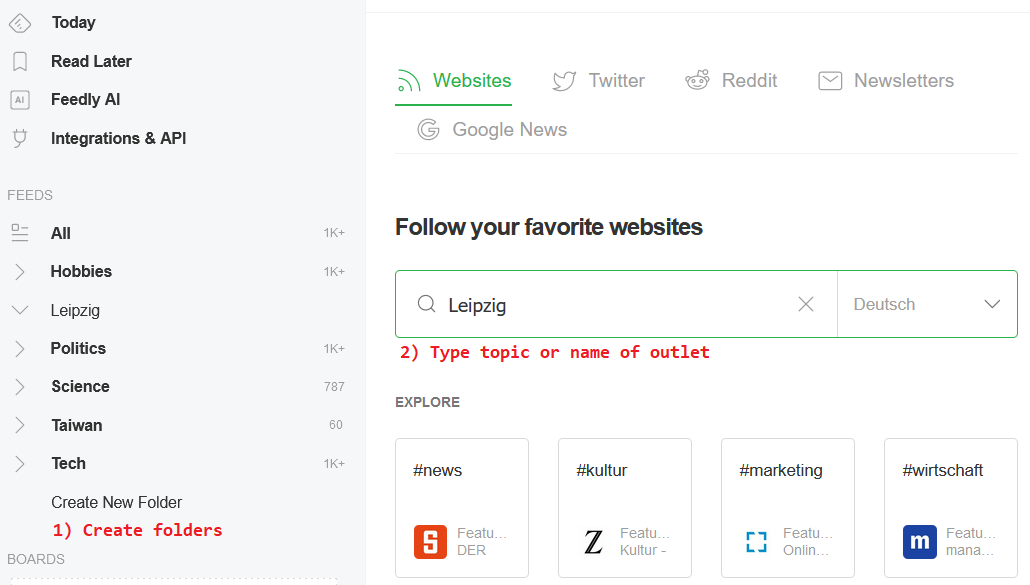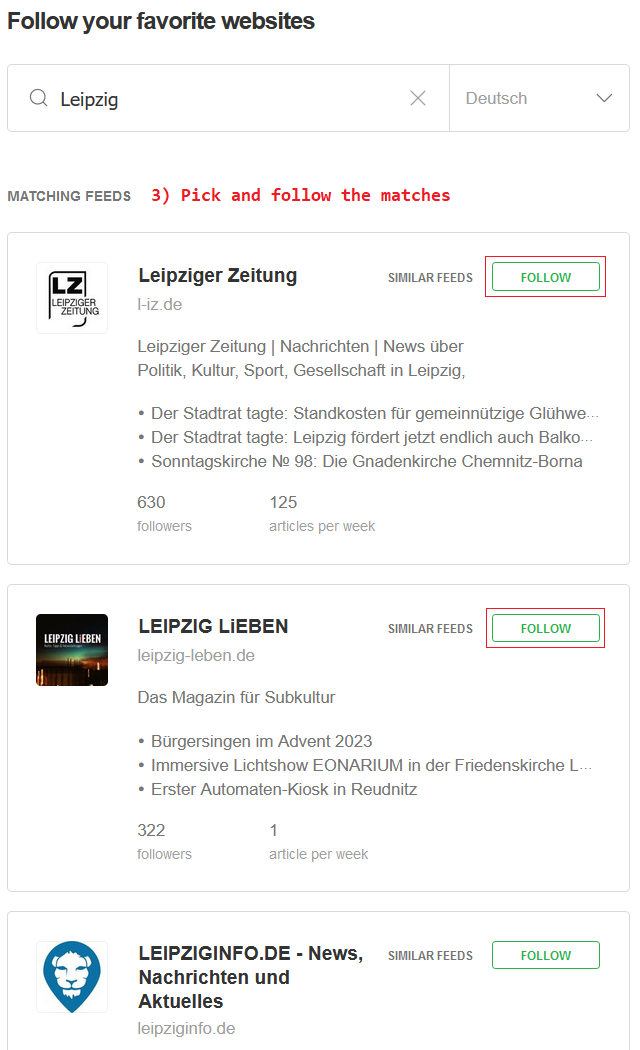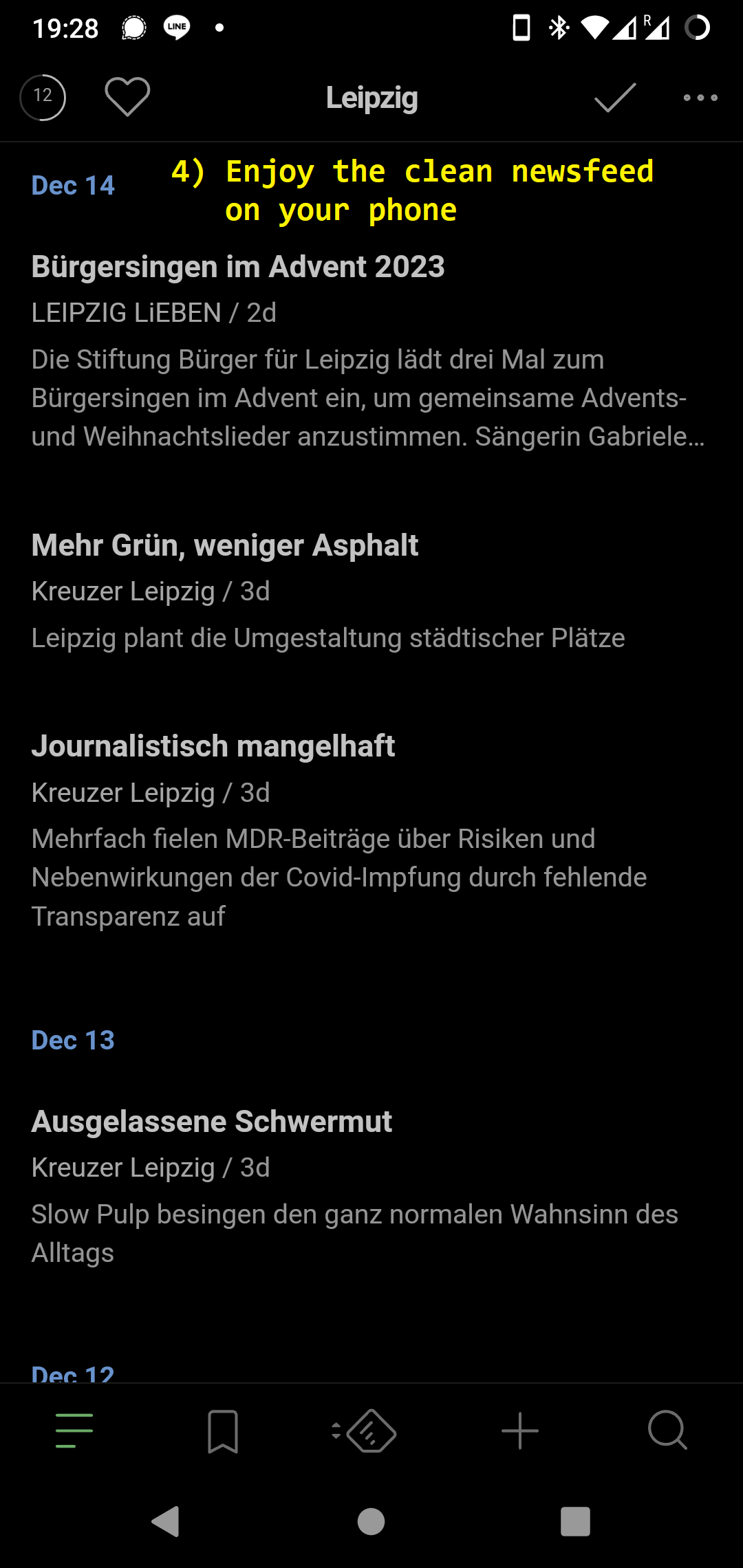RSS News Feeds instead of Social Media
Content
The challenge
It can be a struggle to maintain a balanced diet of news information. In our “mobile-first” era, the previous diversity of the internet has been consolidated into a few mainstream apps. Some of those are preinstalled on our phones (the “n-tv” app used to be pre-installed on German Apple iPhones; not sure if this is still the case) and most of them are social networks and semi-social aggregators such as Facebook, Twitter and Reddit. With curation algorithms that automatically filter and sort content based on your previous clicks, likes and time spent reading, users’ desire to manually build their own library of bookmarks has diminished. At the same time, phone keyboards don’t really invite users to manually type other website addresses. The result is a population that keeps refreshing the same small number of apps and engages in endless doomscrolling until reaching mental burnout.
The answer: RSS news reader
The RSS protocol has been around since 1999 and is supported by pretty much every self-respecting website. It consolidates website news content into simple elements such as headline, sub-headline, teaser-text. An RSS news reader is then able to collect these articles and displays them in a simple, unbiased list. The content that is presented is not defined by what your friends and influencers are posting, nor by and algorithm. Some more advanced RSS readers are also able to detect similar topics between headlines of different sources, reducing redundancy and overlap.
While consuming the news from an RSS reader is no less convenient than scrolling through your social media aggregators, the responsibility of curating the news sources falls back on the end-user. They have to build their library of news sources, sort them by general area of interest and let RSS do the rest.
Building an RSS library is a good way to diversify political views and support journalism while keeping up to date with developments in your trade or industry. It takes emotionality and advertisements out of news presentation, avoids instant gratification and dopamin-addiction and may even limit total screentime, because with an RSS reader and its default chronological sorting mechanism it is quite likely that you will reach a point where you say to yourself: that’s all the news I got today.
Popular RSS news reader apps and services
There are many RSS news readers, but they all work the same way, so it does not really matter which one you use. What matters is your manual library of RSS feeds.
Anyway, to get started, I can recommend either of these two services:
Both are similar as in their free plan allows you to add a large number of feeds and they integrate with their own Android and iOS apps and 3rd party apps for Android and iOS.
If you ever wish to move your feeds to another service, both providers provide an export function via the standardized OPML format. Here, I have exported my current 87 feeds for you in the categories of Hobbies, Tech, Politics, Taiwan and Leipzig:
You can import this to your RSS readers and then delete the sub-folders that may not be relevant to you (e.g. Leipzig, Taiwan).
How to build an RSS feed library
Building your own library can be done in 3 simple steps:
- In your RSS app, create categories or general areas of interest, such as politics, photography, gaming, philosophy etc.
- Add the website URL of a news outlet to the app and assign it to one or more of the above categories. Or search for the name of the outlet in the search engine of your RSS reader.
- You’re done.
Screenshot Examples:



Where can I find news outlets?
Most people can list a dozen of popular news outlets (such as daily newspaper) from the top of their head. But what about all the ones we have not discovered yet or which are too small or too niche to gain mainstream traction? A quick way is to look for community-curated lists of sources for different topics.
News / Politics / Global Affairs
| List | Remark |
| Wikipedia:Reliable sources/Perennial sources | Wikipedia has stringent criteria on what sources it deems reliable enough to be used as primary source when writing Wikipedia articles. Items in the list are categorized as either: • Generally reliable • No consensus • Generally unreliable • Deprecated • Blacklisted • Request for comment • Stale discussions • Discussion in progress The cool thing about this list is that it does not only allows the inclusion of so called “mainstream press”, but it will also list sources with varying degrees of consensus on reliability. You can do with that what you may. The list currently includes almost 400 links to sources. The list is sorted alphabetically by default, but can also sorted by reliability status (consensus) or by the year of the last status update. |
| Wikipedia:Nachschlagewerke im Internet/Zeitungen | Similar to above, but for German news sources. Contains 23 links to currently active sources, plus 28 links to historic sources. It can be assumed that all sources are deemed more or less reliable by consensus. In other words: the German Wikipedia does not have an explicit list of unreliable, controversial or blacklisted sources. |
Related:
Technology
A lot of tech-related that are usually rated in the “Top 10” have become ad-serving platforms, where a lot of the content consists of “special promotions” and “great deals” for apps and consumer gadgets. So take these lists with a grain of salt and don’t hesitate to remove a page from your RSS feed if you find most of their content to lack in substance.
| List | Remark |
| 70 Tech Websites To Follow in 2021 | While this list includes most of the commercially-driven “Top 10” outlets, it also includes many hidden gems and has nice, non-hyped up descriptions for each page. You can easily pick your favorites from this list. |
| Category:American technology news websites | This may yield some additional results, some of them rather vintage. |
| Top Websites Ranking for Tech news in Germany | For the German readers of this blog, this list is pretty comprehensive depicting the German tech press scene. But it does not seem to be complete, because the Top 10 publication “Computerbase” is suspiciously missing. |
| Leading technology media websites in Germany from 2014 to 2016, by number of visits per month | This list may be older, but it includes “Computerbase” on spot #7. |
| 35 Best Germany Technology Blogs and Websites [Feedspot] | This list for German-speakers goes a bit off the beaten path by mostly focusing on blogs instead of traditional websites. Many of them are corporate blogs, but that does not mean that they don’t strife for relevant, unique content. Problem with this list: if you click on the links, the aggregator website will ask you to sign up. Instead you need to right-click on the truncated, grey list below the description. This will yield you the direct link to each blog. |
Business
| List | Remark |
| The Top 20 German publications every startup should know | Just a random example. |
Photography
| List | Remark |
| Top 40 Photography Magazines & Publications [Feedspot] | Pretty comprehensive list. Right-click on the truncated, grey link below each website’s description to yield the direct link to the outlet. |
| Topliste: Die besten Seiten rund um Fotografie [Netzpiloten] | This list for German-speakers is pretty short and most of the links are forums or gallery websites, not news or blogs. Feel free to suggest a better list. |
Science, Sustainability, Environment, Activism
It should not all be mainstream politics, consumerism and entertainment. Regarding the fields of sustainability and environmental activism, the focus here is much more narrow, with specific news outlets (or sub-categories of established journals) instead of meta-lists.
| Outlet | Remark |
| Mongabay | Self-description: a nonprofit environmental science and conservation news platform that produces original reporting in English, Indonesian, Spanish, French, Hindi, and Brazilian Portuguese by leveraging over 800 correspondents in some 70 countries. We are dedicated to evidence-driven objective journalism. |
Artificial Intelligence
Last but not least.
| Outlet | Remark |
| AI Explained | Youtube channel, self-description: covering the biggest news of the century – the arrival of smarter-than-human AI. What is happening, what might soon happen, what it means and what we can do with it. |
Your Suggestions
Please leave your suggestions by contacting me. Suggestions maybe links to public lists of outlets our your own list of recommendations.
Licensed under CC BY.
Leave a Reply